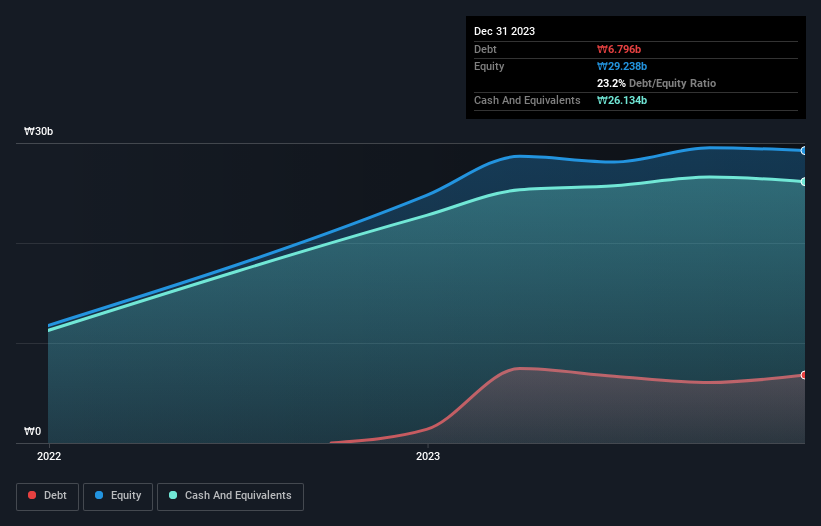- South Korea
- /
- Entertainment
- /
- KOSDAQ:A331520
VALOFELtd (KOSDAQ:331520) Seems To Use Debt Rather Sparingly
Some say volatility, rather than debt, is the best way to think about risk as an investor, but Warren Buffett famously said that 'Volatility is far from synonymous with risk.' So it might be obvious that you need to consider debt, when you think about how risky any given stock is, because too much debt can sink a company. As with many other companies VALOFE Co.,Ltd (KOSDAQ:331520) makes use of debt. But the real question is whether this debt is making the company risky.
When Is Debt A Problem?
Debt and other liabilities become risky for a business when it cannot easily fulfill those obligations, either with free cash flow or by raising capital at an attractive price. In the worst case scenario, a company can go bankrupt if it cannot pay its creditors. However, a more common (but still painful) scenario is that it has to raise new equity capital at a low price, thus permanently diluting shareholders. By replacing dilution, though, debt can be an extremely good tool for businesses that need capital to invest in growth at high rates of return. The first step when considering a company's debt levels is to consider its cash and debt together.
See our latest analysis for VALOFELtd
How Much Debt Does VALOFELtd Carry?
The image below, which you can click on for greater detail, shows that at December 2023 VALOFELtd had debt of ₩6.80b, up from ₩1.36b in one year. However, it does have ₩26.1b in cash offsetting this, leading to net cash of ₩19.3b.

How Strong Is VALOFELtd's Balance Sheet?
According to the last reported balance sheet, VALOFELtd had liabilities of ₩13.5b due within 12 months, and liabilities of ₩1.10b due beyond 12 months. On the other hand, it had cash of ₩26.1b and ₩7.28b worth of receivables due within a year. So it actually has ₩18.8b more liquid assets than total liabilities.
This surplus strongly suggests that VALOFELtd has a rock-solid balance sheet (and the debt is of no concern whatsoever). Having regard to this fact, we think its balance sheet is as strong as an ox. Simply put, the fact that VALOFELtd has more cash than debt is arguably a good indication that it can manage its debt safely.
It is just as well that VALOFELtd's load is not too heavy, because its EBIT was down 92% over the last year. When it comes to paying off debt, falling earnings are no more useful than sugary sodas are for your health. When analysing debt levels, the balance sheet is the obvious place to start. But it is VALOFELtd's earnings that will influence how the balance sheet holds up in the future. So when considering debt, it's definitely worth looking at the earnings trend. Click here for an interactive snapshot.
Finally, a business needs free cash flow to pay off debt; accounting profits just don't cut it. VALOFELtd may have net cash on the balance sheet, but it is still interesting to look at how well the business converts its earnings before interest and tax (EBIT) to free cash flow, because that will influence both its need for, and its capacity to manage debt. Over the last three years, VALOFELtd recorded free cash flow worth a fulsome 96% of its EBIT, which is stronger than we'd usually expect. That puts it in a very strong position to pay down debt.
Summing Up
While we empathize with investors who find debt concerning, you should keep in mind that VALOFELtd has net cash of ₩19.3b, as well as more liquid assets than liabilities. The cherry on top was that in converted 96% of that EBIT to free cash flow, bringing in ₩3.6b. So we don't think VALOFELtd's use of debt is risky. When analysing debt levels, the balance sheet is the obvious place to start. But ultimately, every company can contain risks that exist outside of the balance sheet. We've identified 3 warning signs with VALOFELtd , and understanding them should be part of your investment process.
If you're interested in investing in businesses that can grow profits without the burden of debt, then check out this free list of growing businesses that have net cash on the balance sheet.
New: Manage All Your Stock Portfolios in One Place
We've created the ultimate portfolio companion for stock investors, and it's free.
• Connect an unlimited number of Portfolios and see your total in one currency
• Be alerted to new Warning Signs or Risks via email or mobile
• Track the Fair Value of your stocks
Have feedback on this article? Concerned about the content? Get in touch with us directly. Alternatively, email editorial-team (at) simplywallst.com.
This article by Simply Wall St is general in nature. We provide commentary based on historical data and analyst forecasts only using an unbiased methodology and our articles are not intended to be financial advice. It does not constitute a recommendation to buy or sell any stock, and does not take account of your objectives, or your financial situation. We aim to bring you long-term focused analysis driven by fundamental data. Note that our analysis may not factor in the latest price-sensitive company announcements or qualitative material. Simply Wall St has no position in any stocks mentioned.
About KOSDAQ:A331520
VALOFELtd
Adequate balance sheet with acceptable track record.
Market Insights
Community Narratives


Recently Updated Narratives


Engineered for Stability. Positioned for Growth.


MINISO's fair value is projected at 26.69 with an anticipated PE ratio shift of 20x


Fiverr International will transform the freelance industry with AI-powered growth
Popular Narratives


MicroVision will explode future revenue by 380.37% with a vision towards success


NVDA: Expanding AI Demand Will Drive Major Data Center Investments Through 2026



